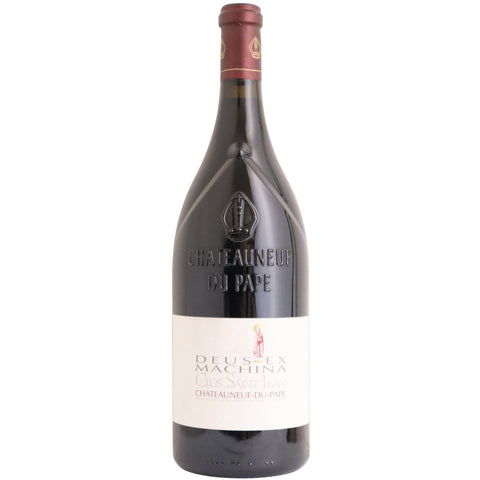
2018 Clos Saint Jean Chateauneuf du Pape "Deus Ex Machina", Rhone Valley, France
A blend of Grenache and Mourvèdre, the 2018 "Dues Ex Machina" features scents of dark fruit, red fruit, thyme, clove, cinnamon, black pepper and mint. The palate is full-bodied, plush, silky and seductive, with outstanding length.
ABOUT THIS WINE
Deus ex Machina is a literary and dramatic term for a miraculous intervention that interrupts a logical course of events in a plot or play. A suitable name for a cuvée that had its start in the torrid vintage of 2003 when Philippe Cambie and Vincent Maurel made the decision to harvest at the end of September, weeks after their neighbors. Deus ex Machina is a blend of old vine Grenache from La Crau, aged in tank with equally ancient Mourvèdre from the sandy soils of Bois-Dauphin aged in demi-muid.
ABOUT THIS PRODUCER
Clos Saint-Jean is a 41-hectare estate in Châteauneuf-du-Pape run by brothers Vincent and Pascal Maurel. Considered by many critics and wine-writers as the preeminent estate espousing the modern style of winemaking in Châteauneuf, this cellar is one of the oldest in the region, having been founded in 1900 by the great-great-grandfather of Vincent and Pascal, Edmund Tacussel. A short time after its founding and well before the AOP of Chateauneuf-du-Pape was created in 1923, Edmund began bottling estate wines in 1910.
The various vineyards of Clos Saint-Jean are located primarily in Le Crau. This plateau is perhaps the most iconic of the many terroirs of Châteauneuf-du-Pape – iron-rich red clays topped with galets. While about 60% of their vineyards are located here, specifically in the lieu-dits of Côteau de Saint-Jean and Cabane de Saint-Jean, another 40% are located in alluvial clay and sandy soils adjacent to the plateau. They also own a small parcel of Mourvèdre in the lieu-dit of Bois-Dauphin near Château Rayas planted on sandy, limestone-rich soils.
The farming at Clos Saint-Jean is fully sustainable due to the warm and dry climate, which prevents the need for chemical inputs. Instead, Vincent and Pascal employ organic methods for pest control, mainly pheromones, to prevent pests from taking up residence in their vines, a process called amusingly enough in French, confusion sexuelle. The vines tended manually, and harvest is conducted in several passes entirely by hand.
Details:
| Grape(s) | Grenache, Mourvèdre |
| Farming | Biodynamic |
